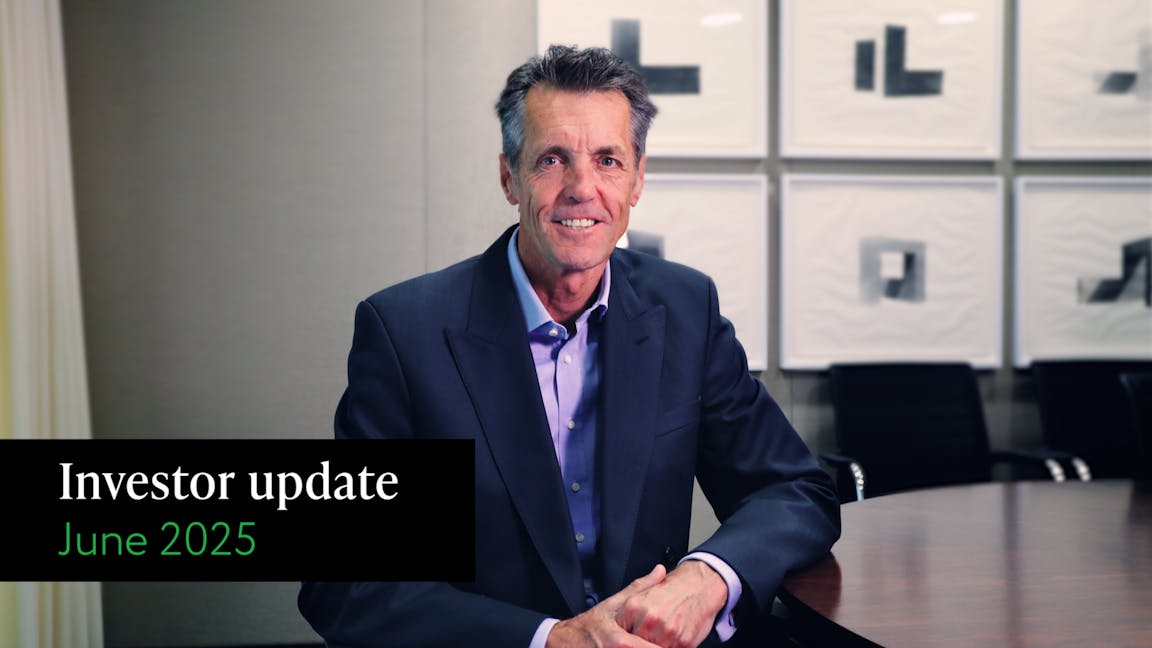
In May, investors were encouraged by the temporary reprieve in some tariff proposals, and equity markets rose. However, the possibility of changes to the US tax system has led to some worry in bond markets.
At a glance:
- We recently adjusted portfolios to reflect the greater market uncertainty, and continue to monitor portfolio performance and risk daily. We are always looking for opportunities to refine our exposure based on incoming macroeconomic news and market data.
- The ongoing uncertainty surrounding US trade policy remains a significant factor in investor confidence. There were some developments that cheered investors in May.
- Investors generally welcomed the temporary relief from tariff concerns, leading to a rise in equity markets, but bond investors had an eye on the Republican Administration's plans for the US tax system.
Portfolio adjustments in May
We recently took the decision to slightly trim exposure to US equities. We did this in all but the highest risk managed portfolios a few weeks ago, and have now also trimmed US equities in the highest risk level too. We still like US equities, and remain overweight. However, the adjustment was made as part of a broader reduction in equity risk, which we have brought in line with our long-term benchmark due to higher market uncertainty.
We also took the decision, in our latest portfolio adjustment, to reduce holdings in Nordic and UK equities in most managed portfolios. We have increased our European equity positions in most managed portfolios, and added to corporate bonds to boost income.
Drivers behind portfolio changes
The red, white and blue elephant in the room is still US trade policy. Where tariff charges imposed by the US end up is still the central source of uncertainty. That matters not only for US-China trade, but global trade.
After the explosive events of 'Liberation Day' – and subsequent 90-day pause – in early April, the US Republican Administration continued to negotiate with trading partners around the remaining blanket 10% tariff rate in May. There were numerous major developments, some of which investors took as good news.
In chronological order:
- 8 May – A deal was reached between the US and UK to reduce import taxes on set quantities of British cars and beef, but the 10% tariff on all other goods remains.
- 13 May – China and the US announced that they would slash tariffs between their nations for a period of 90 days as they negotiate a broader deal. It was announced that the additional US tariffs on Chinese imports would fall to 30% (from 145%), and China’s additional tariffs on US goods would decrease to 10% (from 125%).
- 23 May – The US president proposed, before quickly postponing until July, a possible increase of the current 10% tariff on European goods to 50%.
All of this was before a US trade court questioned the legality of the tariff framework almost in its entirety. The White House appealed that decision, and a federal appeals court ruling means that the tariffs will stay in place for now. Additionally, the presidency has other avenues to use for tariff implementation, beyond the 'economic emergency' route followed so far.
On balance, the developments amounted to a more cheerful month for markets, but clearly all have the potential to change again, for better or worse. We treat any announcements on tariffs – even relatively encouraging ones – with some caution. The fact that negotiations are underway and ongoing has allowed markets to climb down from what were extremely elevated levels of volatility about a month ago. Even so, until US tariffs finally settle at sustainable longer-term levels, the persistence of uncertainty is likely to add friction to international trade and delay business decisions.
Market reactions to May's news
In general, investors were encouraged by the reprieve in tariff worries, and equity markets rose. Two major US indices, the tech-focused NASDAQ and the S&P 500 – that reflects the performance of the 500 largest US companies – continued to recover from the sell-off in April. The FTSE 100 index – that tracks the UK's largest companies – gained ground, as did the main equity markets in Japan, Germany and France.
That's not to say investors were so quick to forget the lingering policy threat. In bond markets, there was considerable selling of US Treasury bonds, as investors digested additional concerns around the US fiscal position – in other words, its capacity to pay its bills – due to the proposed extension and expansion of tax cuts. Questions began to form for international investors about the implications for US assets, resulting in a weaker dollar.
In our recent customer webinar on market volatility, one of the questions we received was on our view of the US dollar. For context, the US dollar has been very strong for about fourteen years, increasing in value against a number of major currencies. Some investors are wondering if its recent weaker performance might be the start of a more lasting trend.
We don't believe that the dollar is at risk of being replaced as the world's reserve currency. The Greenback, as it is known, might be having a bit of a tough time at the moment, but the US economy remains robust overall, and when the dust finally settles, we expect the dollar to stabilise.
It does, however, serve as a reminder that there may be a few more bouts of market turbulence to come, as the details of the longer-term tariff outlook are worked out over coming months.
We continue to monitor portfolio performance and risk on a daily basis. Following our latest portfolio adjustments, we are looking for further opportunities to refine our exposure, which will depend, as ever, on incoming macroeconomic news and market data.
About this update: All figures, unless otherwise stated, relate to the month of May 2025.
Sources: MacroBond, Nutmeg and Bloomberg.
Risk warning
As with all investing, your capital is at risk. The value of your portfolio with Nutmeg can go down as well as up and you may get back less than you invest. Past performance and forecasts are not a reliable indicator of future performance. We do not provide investment advice in this update. Always do your own research.



